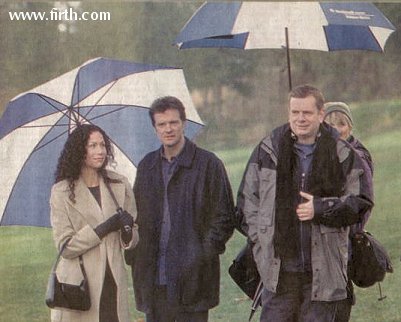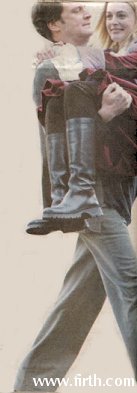But despite what all the hysteria at the time may have led you to believe, life for Colin Firth didn’t begin or end with Pride and Prejudice. He has been acting for 20 years and yes, it’s hard to believe, but Colin saw his 40th birthday come and go a couple of years ago. It’s true that he wasn’t always comfortable with the heart-throb status, but a happy marriage and a second plunge into fatherhood have contributed to his increasingly relaxed attitude, both to life itself and to the roles that he has chosen. His latest appearance on the big screen is in the romantic comedy Hope Springs, playing a British artist who flees to a small American town after he discovers that his fiancée is to marry another man. The part came about through the recommendations of friends, who knew the novel on which the film is based, New Cardiff by Charles Webb. “I was having dinner with a friend who had seen the galleys or something,” explained Colin when we chatted a few days ago. “He said ‘this has got your name on it’—literally.” The character Colin plays is called Colin too. “Then, a couple of days later, I got the same message from another friend about the book, so I went to find it and, by another coincidence, the guy who had the rights to this thing was the producer I happened to be employed by at that time!” Barnaby Thompson and The Importance of Being Earnest, for those of you who like to know all the details. “So I was in a very good position to make myself a pest about it and on hand to lobby for the job more than anyone else,” he added, smiling broadly, making it difficult to imagine him making a pest of himself under any circumstances.
As opposed to? “Well, I suppose as opposed to a stiff English gentleman who is always in a snit or always in a period costume or always confused! It used to be that I was always paranoid or a loser. There is usually one that you seem to associate yourself with at one time or another.” So does he see all parts as essentially autobiographical? “I think so,” he said. “I think like most creative pursuits you are drawing on aspects of yourself. I think that acting is particular in that there is an emphasis in people’s minds on changeability and versatility because acting is perceived to be the art of transforming yourself. “Actually, I don’t see it like that. Although I have made attempts at transformations—quite wild transformations sometimes—it’s not the principally interesting thing for me. “I find it far more interesting taking whatever it is that I might bring to a situation and applying it to the particular problems presented by a story. “In fact I think it’s much harder, in some ways, to play a character closer to yourself than someone wildly different. The nuances and details that you’re asked to deal with—that’s where the challenges are. Actually most actors, with a couple of very notable exceptions, are pretty same-ish no matter what they do—or at least being asked to represent a certain social class or nationality—and there’s nothing wrong with that. “I just see a story and, in this case, it appealed to me partly because it felt close to me in some ways. I mean this is about a confused and bewildered middle-class Englishman adrift in small-town North America—and that has definitely been me!” He wasn’t joking. “I have a very long relationship with America,” he said. “My mother grew up there for a very large part of her childhood and I was schooled there briefly for about a year. I was nicknamed the Yank for years throughout my teens after I came back. I have a son who lives there and it’s a big part of my life.” The actor thought of as the quintessential Englishman at one time acquired American mannerisms and an accent to match. “I was very feeble-minded in that way, I just used to drift according to whatever would make my life easiest,” said Colin. “My first school was a cultural shock—in an estate in Essex—and just when I thought I had mastered the Billericay tones, I was in Hampshire and suddenly I was talking like that.” He adopts on a very creditable Hampshire countryside accent. “And then American—so, strangely enough, I became an actor,” he said with a laugh. York director Mark Herman wanted a switch from English social realist comedies. He found relief in the romantic comedy Hope Springs, as he tells Charles Hutchinson. Once bitten, twice shy, the saying goes, but it went out of the window for York film writer and director Mark Herman. Today, his aptly-named new movie, Hope Springs, opens across Britain. It is his first Anglo-American project since Blame It On The Bellboy in 1992. Unfairly, Mark had been the one to lose out when that Dudley Moore vehicle was flattened by the critics. He was dropped from a three-film contract by Disney but now he is back in the Walk empire’s good books. “It’s a whole different Disney regime and there’s nothing wrong with the way Disney is set up,” says Mark, who bounced back from his Bellboy experience with Brassed Off, Little Voice and Purely Belter, but not before London’s volatile property market had led him to return to his Yorkshire roots. Hope Springs (12A) is a romantic comedy, adapted by Mark from the novel New Cardiff by The Graduate author Charles Webb, sent to him in a proof copy by Fragile Films three Christmases ago. Mark had been looking to change tack after his trilogy of English social realist comedies that culminated in 2000’s low-budget Purely Belter. Hope Springs offered him that chance, and consequently the opportunity to work for the first time with Heather Graham, Oliver Platt and Mary Steenburgen. “I didn’t want to get pigeonholed for doing gritty comedy, and so I was keen to do a romantic comedy but not a run-of-the-mill one, and that’s what attracted me to Charles Webb’s book. It had quite a lot of sarcasm and it wasn’t straightforward,’ says Mark. How did he then land the gig? “Fragile Films have a deal with Disney, and they were seeing quite a few people about making a film of Charles’s book but they liked the idea of a writer-director so I got the job,” says Mark. “It was put back on the Disney slate but then Colin Firth read the book and started inquiring about the rights, and that’s how he came on board and as soon as he was involved it had momentum because he’d just done Bridget Jones’s Diary.” Firth plays Colin Ware, a British artist who seeks out the one American place that promises him Hope, after learning that his fiancée, Vera (Minnie Driver), is to marry another man. The latest man to live in Hope, Vermont, Colin finds new joys in the naïve, naked charms of nurse Mandy (Heather Graham). Who should suddenly turn up but Vera, with another bombshell for poor Colin. The twists and turns are suited to the charm and barbed tongue of Colin Firth, always a box-office draw in Britain, but most appealing of all to Mark was the chance to work on material by Charles Webb, an American who lives in Brighton, Sussex. “I love his book because it’s so quirky,” says Mark. “The Graduate was quirky but this story is even quirkier. “It’s been a strange job writing the adaptation because the book itself feels like a screenplay: heavy on dialogue. I thought my job would have been very easy but it was more difficult than I expected. “Even before the first day’s shoot I was still writing, because Colin Firth was so keen to get on with making the film, so a major part of the writing was done while I was holed up in a hotel room in Vancouver. “As it turned out, it was useful to have the cast there to talk through the script in the two weeks leading up to the shoot, in particular about bits that weren’t working, especially with Colin, who had a real grasp of the book.” Before the book was published, Webb had sent Mark three or four potential endings for the story because he couldn’t make up his mind. “The characters all ended up in London in the novel, and in an early draft I had that ending too but it still felt like there were three or four possible endings in the screenplay, so I kept cutting them off one by one until I had the right one.” His solution? I cut the story off earlier than Charles does!” says Mark. Hope Springs may be set in Vermont but its comedy will register in both Britain and the USA. “One of the things I most like about the script is that it takes the mick out of the Americans and the English at the same time, without being too cruel,” Mark says. He brought the English weather with him to the shoot. “It was an economic decision to film in Vancouver, which is much cheaper than New England. We started looking for locations on the east coast of Canada but shooting there is bad news in winter, so we ended in the only place in Canada that was supposed to have good weather at that time of year, on the West Coast. “But I should have known when there were two umbrellas in my bedroom cupboard at the hotel. You don’t even get that in London. We had perfect weather pre-production and on the first day but then it rained and rained—and it’s not just drizzle; it absolutely pours down!” says Mark. Oh, the
unexpected delights
of filming across the pond. Nothing could have been more unexpected
than
one ‘job applicant’ for the role of Mandy. “Mandy is supposed to be in
her twenties, but we got word that Sharon Stone was desperate to do
it,”
says Mark. Miss Stone is 45 this year.
|

 Does
he accept then that there is a typically Colin Firth role? “I think it
is probably far more easily identified by other people then by me,” he
said. “I usually find, when I get asked questions, that it’s about some
assumption about the type that I’ve been playing. I got a new one
recently,
it was ‘you’re always playing someone who’s attracted to a woman’.”
Colin
laughed as he passed that one on.
Does
he accept then that there is a typically Colin Firth role? “I think it
is probably far more easily identified by other people then by me,” he
said. “I usually find, when I get asked questions, that it’s about some
assumption about the type that I’ve been playing. I got a new one
recently,
it was ‘you’re always playing someone who’s attracted to a woman’.”
Colin
laughed as he passed that one on.